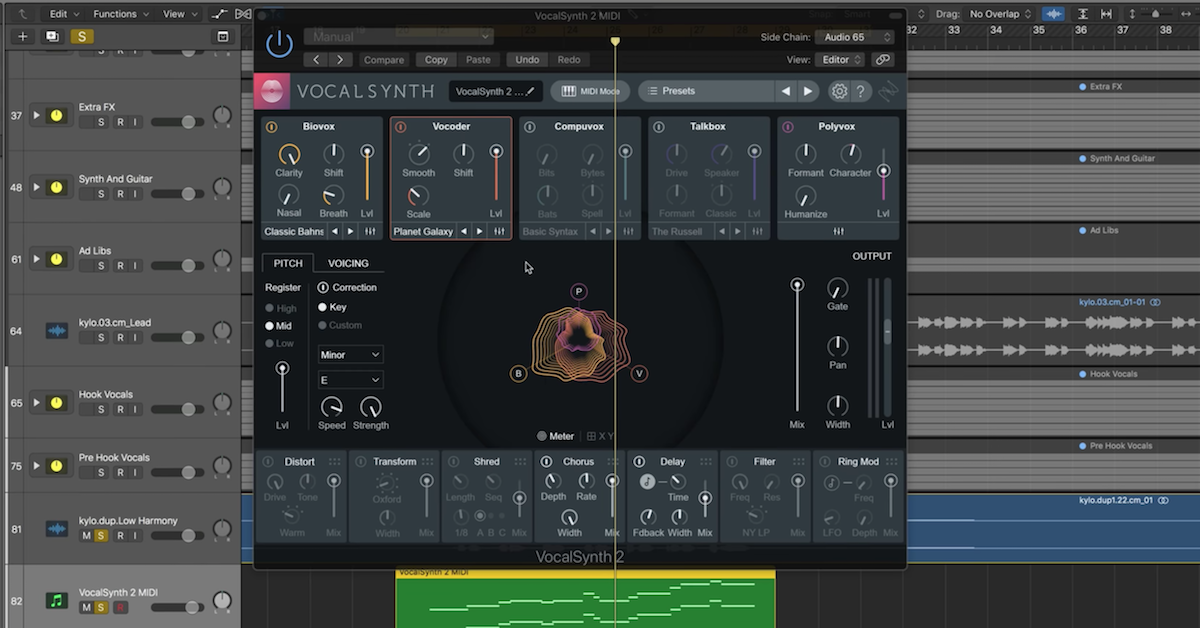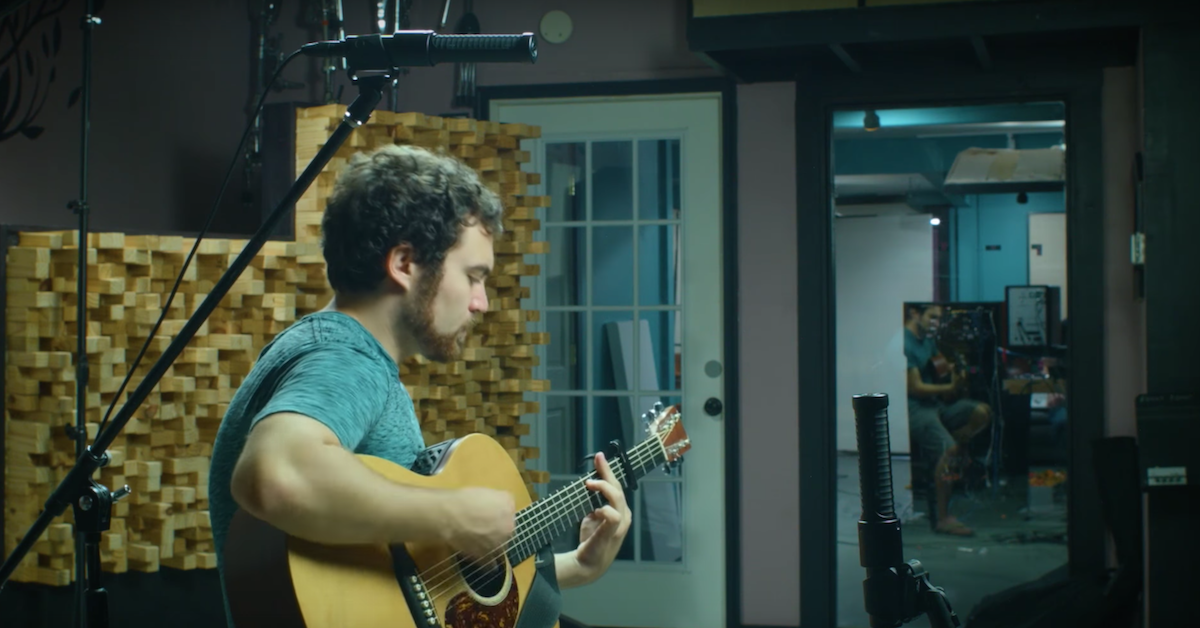Artist Spotlight: Dr. J. Anthony Allen
Article Content
Dr. J. Anthony Allen has worn the hats of composer, producer, songwriter, engineer, sound designer, DJ, remix artist, multi-media artist, performer, inventor, and entrepreneur. I was fortunate enough to take classes with him at McNally Smith College of Music and he opened my eyes to a whole new fusion of art and technology. I recently caught up with him to talk A/V collaboration, the glove, Tone Target, and performing emails in a cafe.
—
Tell us about how you got into music?
I started as a percussionist in my middle school concert band. That was fun, and I went on to pickup the guitar. I took guitar lessons all through high school, playing in a handful of bands as well as our school jazz band. I think my passion for music stems from a combination of my high school band director (Ken Feneley) and my guitar teacher (Pat Sheppard) from that time. After my first few lessons from both of them I was pretty hooked.
At what point did you go from just music to audio/video collaborations?
I’ve always been interested in the collisions of art forms. Before I understood anything about the history and tradition of creative collaboration, I was hanging out with artists and trying to see how we could work together. It doesn’t seem all the strange to me, actually. It’s a pretty natural thing: I’m an artist (although my medium happens to be music), working with another artist (who’s medium might be paint, ceramics, video, etc.) is just what artists do. I dare you to find me a successful musician that has survived in an artistic bubble.
To answer your question a little more directly: The first major collaborative project I did was a work with some improv theater performers when I was in college. Every couple of months they did a fundraiser called, “24 Hour Theater”. The idea was that these playwrights would go into a theater at 8pm, draw names out of a hat, and then have 24 hours to write a play for them, rehearse it, and perform it at 8pm the next night. After hearing about it, I cold called them. I told them it was a cool idea, and that they should try a 24-hour Opera. So they invited me to try it the next time they did. It was hard.
You’ve been involved in quite a few projects combining audio and video. What inspired this? Any projects you’re particularly proud of?
Well, to build off my previous answer, I started trying to create video myself (rather than collaborate) when I was in grad school at Peabody. I did a lot of projects where I made the video myself. It was never very brilliant video, and I didn’t really expect it to be. I mostly wanted to do it to learn what the artistic process of working with video was like, so that when I collaborated with video artists (or, later, scored films) I would have a better understanding of what went into it.
Projects I’m particularly proud of? Well, I think the most successful artistically has been the Urban Echo projects with Chris Baker. I think those turned out really well, had a good reception, and were fun to work on.
What might be somewhat interesting is the collaboration that I’m least proud of.
There was one that was a play I was working on. The script was funny, so I signed on to write some of the music for it. As the production came together, I realized how dreadfully bad it was going to be. I lost all confidence in it. I really wanted out of the whole project, but I couldn’t leave them high and dry. So I told them to take the music I had written, use it, but to leave my name off everything. I didn’t want any credit. As it turned out, it ended up coming together really well and got really fantastic reviews. Oops.
What are some of your favorite projects you’ve been involved in?
My favorite stuff for the last few years has been my Ballet Mech stuff.
Ballet Mech is a group of 3 producers/composers. Every now and then we do a new project together. A few years ago we did a big production at Macalester College, which was an insane amount of work but really rewarding. Right now, we are just finishing up a remix album of Jeremy Messersmith’s entire last album. (Out on Sept. 15). I think the Ballet Mech projects tend to get me excited because, A) We only take on projects that we really believe we can make something great with, and B) It’s working with 2 of my best friends. So it’s fun.
Do you think EDM has been enhanced or cheapened by the rise in accessibility of technology?
Enhanced. Definitely.
I can see both sides to the conversation on this. On the one hand, you have people producing music that might be largely uneducated in the vocabulary of their art form. This is sometimes seen as “cheapening” music, because any 12 year old kid that wants to crank out some tunes can have them on iTunes in a few hours, without really understanding what they are doing. (both musically and technologically, on the production side.)
On the other hand, you have a new realm of people with access to the tools they need to create music. Bad music or good music, more accessibility of the tools to create means more people creating. To me, this is a good thing.
To look at it another way: Let’s say you could go back in time, and you travel to Seattle – 1952. A 10 year old Jimi Hendrix is walking past a music store. Instead of seeing a guitar in the window and instantly falling in love with it, you switch that guitar with a bassoon. What do you think would happen? Would Jimi Hendrix never have been heard of by us 60 years later? Or would he have demonstrated his inherent musical brilliance on the bassoon?
I think we would all be wanting to learn the Bassoon. Because the guitar isn’t what made Hendrix brilliant – it was his creativity. The guitar was simply his chosen tool. Fast forward back to the present: the rise of accessibility in technology only means that more people will have the ability to choose EDM as their tool to show their musical creativity. If someone does not have this ability to begin with, having access to Pro Tools or Ableton Live or FL Studio isn’t going to do them any good. Access to a computer will not make anyone a brilliant musician. It’s only a tool. The more people that have access to the tools, however, the more chances we have to find the next Hendrix.
Tell us about your infamous Glove.
When I was in college, I performed almost every day as a guitarist. I taught lessons, played gigs in a bunch of jazz groups, rock bands, and some classical stuff. When I went to grad school and focused completely on composition, I started to miss performing a little. But I was working with electronic music, and I was a crappy keyboard player, so I didn’t really have any good options to perform my electronic pieces.
So I got one of my teachers that understood a good bit about electrical engineering to help me build a way that I could manipulate the electronic music I was working on with my hands. Gloves were pretty logical for that, so I put a bunch of sensors into a set of gloves and made them into a controller. I played a lot of gigs with these things, all over the country. I haven’t done much with them lately, but they are still around.
Have any projects gotten you in trouble?
I don’t really think I’ve been all that controversial. I’ve done some projects the ruffled some feathers, for sure, but it wasn’t to be shocking. There was always a point.
What about intercepting emails and IMs in a cafe and performing them live?
That was a piece called Coffee Cantata – another collaboration with Chris Baker, who I mentioned before. That piece had two singers, on stage, improvising the melody with the text we were providing them. The text was coming from a nearby coffee shop, where we were monitoring all the internet traffic, and sending emails and instant message conversations into the performances for the singers in real time. It ended up being really interesting. It was intrusive to the people in the coffee shop, for sure. But they didn’t know their conversations were being turned into a piece of music, so it wasn’t really intrusive to them at all (sort of.)
I’ve done a handful of pieces that used “borrowed” information like that. It’s surprisingly easy to do.
Tell us about the Tone Target app. What gave you the idea and what was the biggest challenge in developing it?
I got the idea for it from a debate that I was seeing happing surrounding the game world and the music teacher world. The argument was basically: Is Guitar Hero good or bad for music?
I vote good. It doesn’t teach anyone to play the guitar. But – it did spur a lot of interest in learning how to actually play the guitar. So I got the idea to develop a game that would actually teach people the guitar – and as it turned out – any instrument, including their voice. I built a simple proof-of-concept version of the game, just to show it could work, and I took that to Harry Chalmiers – the president of McNally. He really supported it, and gave me the green-light to keep working on it. I brought in Audiofile Engineering to build it, and it came together pretty easily, at first.
The biggest challenge was writing all the levels. It comes with about 400 levels, and I had to write every single one of them… three times. It took me 6 months.
What is your favorite part of working at McNally Smith College of Music?
Before I taught at McNally, I had some other teaching gigs at more traditional colleges. At those, I was generally considered the “weird guy” because I experimented with writing beats, and working with synths and things. But everyone knew that my main work was writing orchestra music, string quartets, etc. At McNally – it’s flipped. I’m still the “weird guy” – but at McNally it’s because I experiment with writing orchestra music and string quartets, while my real work is writing beats and working with synths.
I’m much more comfortable in this kind of a skin.
Aside from that, it’s just a fun place to work. I get to have amazing co-workers, teach stuff that I love talking about… it’s fun stuff.
——
Click here to learn more about J. Anthony Allen.





